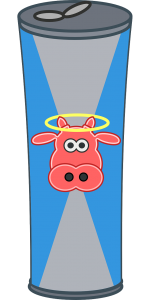
With recent attitudes devaluing the energy drink within the ranks of cigarettes, McDonald’s, & seemingly Satan himself, I naturally spit-sprayed coffee all over my computer screen when I read that people were supplementing taurine, a classic energy drink compound… as a nootropic?!
What the hell are they thinking?? I thought.
They’re not thinking, I concluded. Because the taurine had already rotted their brain, corrupting their ability to think. Corrupting their health. Their soul.
Until I read further on a new, unstained computer that taurine actually does possess brain healthy benefits, potentially to a clinical degree. After compiling & reviewing the evidence, I finished my Starbucks Unicorn Frappuccino and began this review.
Page Contents
How Taurine Is Supposed to Work
Red Bull essentially made Taurine famous, indirectly linking the amino acid compound with intense energy & bull-like vigor, despite a reality that categorizes taurine as a sedative more so than a stimulant.
That’s right:
Taurine doesn’t get you amped, it gets you settled.

And here’s a couple other myths surrounding this compound: Taurine is not sourced from bull testicles (although, it is naturally found in red meats & dairy products) and it’s not an actual amino acid. It’s an amino sulfonic acid, different from the amino acid building blocks of protein.
Within the body, taurine purportedly performs a variety of functions, potentially possessing significant therapeutic action against neurodegenerative cognitive disorders — yet, we’ll need more clinical trials to confirm this.
In fact, what we do know of taurine’s benefits are limited due to a scarcity of human research on the compound. Having said that, there are a few identified biomechanisms that corroborate with taurine’s role as a nootropic sedative, including:
GABA & Glycine Receptor Modulation
While taurine fails to easily cross the blood-brain barrier, the compound engages a unique carrier-mediated transport system that delivers it across the blood-retinal barrier, essentially giving taurine backdoor access to nervous tissue. Once there, taurine functions as an inhibitory neurotransmitter, calming brain activity by engaging the GABA & glycine receptors. Modulation of these brain systems reduces excess stimulation (THINK: anxiety & stress) while exerting anxiolytic relaxation.
Anti-Aging Neuroprotection
Taurine is often touted as an antioxidant, occasionally as an anti-inflammatory. This study suggests that taurine’s neuroprotective role is an amalgamation of effects, particularly on the GABAergic & somatostatinergic (growth hormone inhibitor) system, with taurine altering measures of GABA & glutamate, neuropeptide somatostatin, hippocampal expression, and more. Through interaction with the GABAergic system, taurine supplementation is believed to help forestall age-related cognitive decline.
Why is Taurine Associated with Bulls?
Okay, this is pretty nasty, but in the early 19th century taurine was discovered & isolated from bull bile — the word “taurine” coming from the Latin taurus, meaning bull or ox. Not the most savory thought, but at least it beats the “taurine is bull semen” rumor that continues to circulate.
Taurine Benefits

Anecdotally, taurine helps with anxiety, its anxiety-reducing effects viewed as beneficial to mood & cognitive longevity. In combination with caffeine & other energy drink ingredients, taurine is believed to “take the edge off” the excess stimulation. (Although, I believe L-Theanine is better reserved for that role.)
Scientifically, taurine is under-researched, at least within the human realm. Researchers have proposed a number of therapy scenarios with which taurine may be of assistance, yet for recreational cognitive enhancement, there isn’t much. On that note, there are a few studies (most of them animal studies) that demonstrate positive effects with taurine administration. Most of the data remains preliminary, yet promising.
Researchers Have Suggested Taurine Might:
Increase hippocampal neurogenesis (Mice)
This animal study investigated taurine’s anti-inflammatory effects on age-related inflammatory & reduced hippocampal neurogenesis, two key factors in cognitive impairment, by administrating the compound to middle-aged mice. Results indicated an increase in stem/progenitor cell proliferation as well as an increased survival rate of newborn neurons, leading to a net increase in neurogenesis. The researchers concluded the study in support of the “beneficial role of taurine on hippocampal neurogenesis in the context of brain aging.”
Produce an anxiolytic-like effect (Mice)
To determine the anxiolytic & behavioral effects of taurine after single & repeated administration, this study administered the compound to rats and observed their performance in three anxiety models: the open field, hole-board, & social interaction test. Results were compared to the positive control diazepam, a pharmaceutical grade anti-anxiety. In all tests, taurine significantly increased rat social interaction & self-initiation (e.g. the number of center entries in the open field test, the rat equivalent of treading new territory). In conclusion, the researchers stated that “taurine produces an anxiolytic-like effect in these animal models and may act as a modulator or anti-anxiety agent in the central nervous system.”
Take the backseat to caffeine in energy drinks
Three energy drink ingredients were observed in this study: Caffeine, Taurine, & Glucose. The idea: Evaluate the effects of caffeine, taurine, & glucose independently and in combination to determine their effects on cognitive performance & mood in “24-hour caffeine-abstained habitual caffeine consumers.” Salivary cortisol, mood, & heart rate were measured for each group, the results finding that taurine reversed the effects of caffeine on vigor & caffeine-withdrawal symptoms. Admittedly, not the best design for a strict “taurine study,” yet valuable in its insights on taurine’s role in energy drinks, this study ended with the conclusion: “Caffeine, not taurine or glucose, is likely responsible for reported changes in cognitive performance following consumption of energy drinks, especially in caffeine-withdrawn habitual caffeine consumers.”
How to Take Taurine
- Retail taurine supplements typically supply 500 to 1000 mg dosages.
- Up to 3000 mg daily is deemed as safe.
- I recommend supplementing taurine on an “as-needed” basis, popping 1000 mg or so to alleviate incidents of anxiety or stress. Try stacking with tyrosine (as N-Acetyl-L-Tyrosine), another anxiolytic amino acid. More on L-Tyrosine.
My Experience with Taurine
Taurine isn’t a nootropic I typically supplement as a standalone ingredient.

There are manufactured supplements with taurine that I have taken, yet in each case I couldn’t tell you if the compound had a significant effect on my cognition or not. Especially since it often comes paired with other anxiolytic compounds, most notably L-theanine & L-tyrosine.
In my younger, more innocent days, when I blissfully partook in the occasional energy drink, I was likely consuming more taurine than I do now as a full-grown Nootropic Geek. And even in the context of unhealthy energy drinks, which do affect cognition, nothing about the experience felt anxiolytic, with exception to the initial burst of feel-good dopamine.
Health enthusiasts often accuse energy drink manufacturers of using taurine to mellow out the caffeinated energy, allowing energy drinkers to drink more energy drinks.
I haven’t seen any research to back this claim. Nor does my own experience lead me to believe in it, but I could believe that energy drink manufacturers justified adding taurine based on the presumption that it takes the edge off of caffeine. (Even though, L-theanine remains a better amino for this task.)
Is Taurine a Good Nootropic?
Taurine is on the fence, straddling the line between cognitive enhancer and cognitive tranquilizer. And while tranquility may equate enhancement in certain circumstances, taurine seems to err on the side of sedation, which I normally don’t attribute to high-ranking anti-anxiety nootropics.
Having said that, taurine is great for anxiety.
Does that mean it’s great for cognition?
Possibly. I definitely wouldn’t discount the compound as an essential nootropic, pending future research. However, until those future studies become available, I’ll be keeping taurine on hand simply for acute moments of stress & anxiety, to be taken in combination with other (better) anxiolytic, adaptogenic nootropics.
Which don’t include Red Bull or Rocky Mountain Oysters.
Overall Taurine Nootropic Power Rating
Brain Energy
Neurotransmitters
Cerebral Circulation
Brainwaves
Brain Regeneration
Neuroprotective
Very interesting article about taurine, really helpful
Much appreciated, Taurina!